- Home
- Roald Dahl
The Best of Roald Dahl Page 11
The Best of Roald Dahl Read online
Page 11
'Am I not permitted to look at the pictures?'
'I have asked you to leave.'
Drioli stood his ground. He felt suddenly, overwhelmingly outraged.
'Let us not have trouble,' the man was saying. 'Come on now, this way.' He put a fat white paw on Drioli's arm and began to push him firmly to the door.
That did it. 'Take your goddam hands off me!' Drioli shouted. His voice rang clear down the long gallery and all the heads jerked around as one - all the startled faces stared down the length of the room at the person who had made this noise. A flunkey came running over to help, and the two men tried to hustle Drioli through the door. The people stood still, watching the struggle. Their faces expressed only a mild interest, and seemed to be saying, 'It's all right. There's no danger to us. It's being taken care of.'
'I, too!' Drioli was shouting. 'I, too, have a picture by this painter! He was my friend and I have a picture which he gave me!'
'He's mad.'
'A lunatic. A raving lunatic'
'Someone should call the police.'
With a rapid twist of the body Drioli suddenly jumped clear of the two men, and before anyone could stop him he was running down the gallery shouting, 'I'll show you! I'll show you! I'll show you!' He flung off his overcoat, then his jacket and shirt, and he turned so that his naked back was towards the people.
'There!' he cried, breathing quickly. 'You see? There it is!'
There was a sudden absolute silence in the room, each person arrested in what he was doing, standing motionless in a kind of shocked, uneasy bewilderment. They were staring at the tattooed picture. It was still there, the colours as bright as ever, but the old man's back was thinner now, the shoulder blades protruded more sharply, and the effect, though not great, was to give the picture a curiously wrinkled, squashed appearance.
Somebody said, 'My God, but it is!'
Then came the excitement and the noise of voices as the people surged forward to crowd round the old man.
'It is unmistakable!'
'His early manner, yes?'
'It is fantastic, fantastic!'
'And look, it is signed!'
'Bend your shoulders forward, my friend, so that the picture stretches out flat.'
'Old one, when was this done?'
'In 1913,' Drioli said, without turning around. 'In the autumn of 1913.'
'Who taught Soutine to tattoo?'
'I taught him.'
'And the woman?'
'She was my wife.'
The gallery owner was pushing through the crowd towards Drioli. He was calm now, deadly serious, making a smile with his mouth. 'Monsieur,' he said, 'I will buy it.' Drioli could see the loose fat upon the face vibrating as he moved his jaw. 'I said I will buy it, Monsieur.'
'How can you buy it?' Drioli asked softly.
'I will give two hundred thousand francs for it.' The dealer's eyes were small and dark, the wings of his broad nose-base were beginning to quiver.
'Don't do it!' someone murmured in the crowd. 'It is worth twenty times as much.'
Drioli opened his mouth to speak. No words came, so he shut it; then he opened it again and said slowly, 'But how can I sell it?' He lifted his hands, let them drop loosely to his sides. 'Monsieur, how can I possibly sell it?' All the sadness in the world was in his voice.
'Yes!' they were saying in the crowd. 'How can he sell it? It is a part of himself!'
'Listen,' the dealer said, coming up close. 'I will help you. I will make you rich. Together we shall make some private arrangement over this picture, no?'
Drioli watched him with slow, apprehensive eyes. 'But how can you buy it, Monsieur? What will you do with it when you have bought it? Where will you keep it? Where will you keep it tonight? And where tomorrow?'
'Ah, where will I keep it? Yes, where will I keep it? Now, where will I keep it? Well, now ...' The dealer stroked the bridge of his nose with a fat white finger. 'It would seem,' he said, 'that if I take the picture, I take you also. That is a disadvantage.' He paused and stroked his nose again. 'The picture itself is of no value until you are dead. How old are you, my friend?'
'Sixty-one.'
'But you are perhaps not very robust, no?' The dealer lowered the hand from his nose and looked Drioli up and down, slowly, like a farmer appraising an old horse.
'I do not like this,' Drioli said, edging away. 'Quite honestly, Monsieur, I do not like it.' He edged straight into the arms of a tall man who put out his hands and caught him gently by the shoulders. Drioli glanced around and apologized. The man smiled down at him, patting one of the old fellow's naked shoulders reassuringly with a hand encased in a canary-coloured glove.
'Listen, my friend,' the stranger said, still smiling. 'Do you like to swim and bask yourself in the sun?'
Drioli looked up at him, rather startled.
'Do you like fine food and red wine from the great chateaux of Bordeaux?' The man was still smiling, showing strong white teeth with a flash of gold among them. He spoke in a soft coaxing manner, one gloved hand still resting on Drioli's shoulder. 'Do you like such things?'
'Well - yes,' Drioli answered, still greatly perplexed. 'Of course.'
'And the company of beautiful women?'
'Why not?'
'And a cupboard full of suits and shirts made to your own personal measurements? It would seem that you are a little lacking for clothes.'
Drioli watched this suave man, waiting for the rest of the proposition.
'Have you ever had a shoe constructed especially for your own foot?'
'No.'
'You would like that?'
'Well ...'
'And a man who will shave you in the mornings and trim your hair?'
Drioli simply stood and gaped.
'And a plump attractive girl to manicure the nails of your fingers?'
Someone in the crowd giggled.
'And a bell beside your bed to summon a maid to bring your breakfast in the morning? Would you like these things, my friend? Do they appeal to you?'
Drioli stood still and looked at him.
'You see, I am the owner of the Hotel Bristol in Cannes. I now invite you to come down there and live as my guest for the rest of your life in luxury and comfort.' The man paused, allowing his listener time to savour this cheerful prospect.
'Your only duty - shall I call it your pleasure - will be to spend your time on my beach in bathing trunks, walking among my guests, sunning yourself, swimming, drinking cocktails. You would like that?'
There was no answer.
'Don't you see - all the guests will thus be able to observe this fascinating picture by Soutine. You will become famous, and men will say, "Look, there is the fellow with ten million francs upon his back." You like this idea, Monsieur? It pleases you?'
Drioli looked up at the tall man in the canary gloves, still wondering whether this was some sort of a joke. 'It is a comical idea,' he said slowly. 'But do you really mean it?'
'Of course I mean it.'
'Wait,' the dealer interrupted. 'See here, old one. Here is the answer to our problem. I will buy the picture, and I will arrange with a surgeon to remove the skin from your back, and then you will be able to go off on your own and enjoy the great sum of money I shall give you for it.'
'With no skin on my back?'
'No, no, please! You misunderstand. This surgeon will put a new piece of skin in the place of the old one. It is simple.'
'Could he do that?'
'There is nothing to it.'
'Impossible!' said the man with the canary gloves. 'He's too old for such a major skin-grafting operation. It would kill him. It would kill you, my friend.'
'It would kill me?'
'Naturally. You would never survive. Only the picture would come through.'
'In the name of God!' Drioli cried. He looked around aghast at the faces of the people watching him, and in the silence that followed, another man's voice, speaking quietly from the back of the group, could be he
ard saying, 'Perhaps, if one were to offer this old man enough money, he might consent to kill himself on the spot. Who knows?' A few people sniggered. The dealer moved his feet uneasily on the carpet.
Then the hand in the canary glove was tapping Drioli again upon the shoulder. 'Come on,' the man was saying, smiling his broad white smile. 'You and I will go and have a good dinner and we can talk about it some more while we eat. How's that? Are you hungry?'
Drioli watched him, frowning. He didn't like the man's long flexible neck, or the way he craned it forward at you when he spoke, like a snake.
'Roast duck and Chambertin,' the man was saying. He put a rich succulent accent on the words, splashing them out with his tongue. 'And perhaps a souffle aux marrons, light and frothy.'
Drioli's eyes turned up towards the ceiling, his lips became loose and wet. One could see the poor old fellow beginning literally to drool at the mouth.
'How do you like your duck?' the man went on. 'Do you like it very brown and crisp outside, or shall it be ...'
'I am coming,' Drioli said quickly. Already he had picked up his shirt and was pulling it frantically over his head. 'Wait for me, Monsieur. I am coming.' And within a minute he had disappeared out of the gallery with his new patron.
It wasn't more than a few weeks later that a picture by Soutine, of a woman's head, painted in an unusual manner, nicely framed and heavily varnished, turned up for sale in Buenos Aires. That - and the fact that there is no hotel in Cannes called Bristol - causes one to wonder a little, and to pray for the old man's health, and to hope fervently that wherever he may be at this moment, there is a plump attractive girl to manicure the nails of his fingers, and a maid to bring him his breakfast in bed in the mornings.
Edward the Conqueror
[1953]
Louisa, holding a dishcloth in her hand, stepped out the kitchen door at the back of the house into the cool October sunshine.
'Edward!' she called. 'Ed-ward! Lunch is ready!'
She paused a moment, listening; then she strolled out on to the lawn and continued across it - a little shadow attending her - skirting the rose bed and touching the sundial lightly with one finger as she went by. She moved rather gracefully for a woman who was small and plump, with a lilt in her walk and a gentle swinging of the shoulders and the arms. She passed under the mulberry tree on to the brick path, then went all the way along the path until she came to the place where she could look down into the dip at the end of this large garden.
'Edward! Lunch!'
She could see him now, about eighty yards away, down in the dip on the edge of the wood - the tallish narrow figure in khaki slacks and dark-green sweater, working beside a big bonfire with a fork in his hands, pitching brambles on to the top of the fire. It was blazing fiercely, with orange flames and clouds of milky smoke, and the smoke was drifting back over the garden with a wonderful scent of autumn and burning leaves.
Louisa went down the slope towards her husband. Had she wanted, she could easily have called again and made herself heard, but there was something about a first-class bonfire that impelled her towards it, right up close so she could feel the heat and listen to it burn.
'Lunch,' she said, approaching.
'Oh, hello. All right - yes. I'm coming.'
'What a good fire.'
'I've decided to clear this place right out,' her husband said. 'I'm sick and tired of all these brambles.' His long face was wet with perspiration. There were small beads of it clinging all over his moustache like dew, and two little rivers were running down his throat on to the turtleneck of the sweater.
'You better be careful you don't overdo it, Edward.'
'Louisa, I do wish you'd stop treating me as though I were eighty. A bit of exercise never did anyone any harm.'
'Yes, dear, I know. Oh, Edward! Look! Look!'
The man turned and looked at Louisa, who was pointing now to the far side of the bonfire.
'Look, Edward! The cat!'
Sitting on the ground, so close to the fire that the flames sometimes seemed actually to be touching it, was a large cat of a most unusual colour. It stayed quite still, with its head on one side and its nose in the air, watching the man and woman with a cool yellow eye.
'It'll get burnt!' Louisa cried, and she dropped the dishcloth and darted swiftly in and grabbed it with both hands, whisking it away and putting it on the grass well clear of the flames.
'You crazy cat,' she said, dusting off her hands. 'What's the matter with you?'
'Cats know what they're doing,' the husband said. 'You'll never find a cat doing something it doesn't want. Not cats.'
'Whose is it? You ever seen it before?'
'No, I never have. Damn peculiar colour.'
The cat had seated itself on the grass and was regarding them with a sidewise look. There was a veiled inward expression about the eyes, something curiously omniscient and pensive, and around the nose a most delicate air of contempt, as though the sight of these two middle-aged persons - the one small, plump, and rosy, the other lean and extremely sweaty - were a matter of some surprise but very little importance. For a cat, it certainly had an unusual colour - a pure silvery grey with no blue in it at all - and the hair was very long and silky.
Louisa bent down and stroked its head. 'You must go home,' she said. 'Be a good cat now and go on home to where you belong.'
The man and wife started to stroll back up the hill towards the house. The cat got up and followed, at a distance at first, but edging closer and closer as they went along. Soon it was alongside them, then it was ahead, leading the way across the lawn to the house, and walking as though it owned the whole place, holding its tail straight up in the air, like a mast.
'Go home,' the man said. 'Go on home. We don't want you.'
But when they reached the house, it came in with them, and Louisa gave it some milk in the kitchen. During lunch, it hopped up on to the spare chair between them and sat through the meal with its head just above the level of the table, watching the proceedings with those dark-yellow eyes which kept moving slowly from the woman to the man and back again.
'I don't like this cat,' Edward said.
'Oh, I think it's a beautiful cat. I do hope it stays a little while.'
'Now, listen to me, Louisa. The creature can't possibly stay here. It belongs to someone else. It's lost. And if it's still trying to hang around this afternoon, you'd better take it to the police. They'll see it gets home.'
After lunch, Edward returned to his gardening. Louisa, as usual, went to the piano. She was a competent pianist and a genuine music-lover, and almost every afternoon she spent an hour or so playing for herself. The cat was now lying on the sofa, and she paused to stroke it as she went by. It opened its eyes, looked at her a moment, then closed them again and went back to sleep.
'You're an awfully nice cat,' she said. 'And such a beautiful colour. I wish I could keep you.' Then her fingers, moving over the fur on the cat's head, came into contact with a small lump, a little growth just above the right eye.
'Poor cat,' she said. 'You've got bumps on your beautiful face. You must be getting old.'
She went over and sat down on the long piano bench, but she didn't immediately start to play. One of her special little pleasures was to make every day a kind of concert day, with a carefully arranged programme which she worked out in detail before she began. She never liked to break her enjoyment by having to stop while she wondered what to play next. All she wanted was a brief pause after each piece while the audience clapped enthusiastically and called for more. It was so much nicer to imagine an audience, and now and again while she was playing - on the lucky days, that is - the room would begin to swim and fade and darken, and she would see nothing but row upon row of seats and a sea of white faces upturned towards her, listening with a rapt and adoring concentration.
Sometimes she played from memory, sometimes from music. Today she would play from memory; that was the way she felt. And what should the programme be? She
sat before the piano with her small hands clasped on her lap, a plump rosy little person with a round and still quite pretty face, her hair done up in a neat bun at the back of her head. By looking slightly to the right, she could see the cat curled up asleep on the sofa, and its silvery-grey coat was beautiful against the purple of the cushion. How about some Bach to begin with? Or, better still, Vivaldi. The Bach adaptation for organ of the D minor Concerto Grosso. Yes - that first. Then perhaps a little Schumann. Carnaval? That would be fun. And after that - well, a touch of Liszt for a change. One of the Petrarch Sonnets. The second one - that was the loveliest - the E major. Then another Schumann, another of his gay ones - Kinderscenen. And lastly, for the encore, a Brahms waltz, or maybe two of them if she felt like it.
Vivaldi, Schumann, Liszt, Schumann, Brahms. A very nice programme, one that she could play easily without the music. She moved herself a little closer to the piano and paused a moment while someone in the audience - already she could feel that this was one of the lucky days - while someone in the audience had his last cough; then, with the slow grace that accompanied nearly all her movements, she lifted her hands to the keyboard and began to play.
She wasn't, at that particular moment, watching the cat at all - as a matter of fact she had forgotten its presence - but as the first deep notes of the Vivaldi sounded softly in the room, she became aware, out of the corner of one eye, of a sudden flurry, a flash of movement on the sofa to her right. She stopped playing at once. 'What is it?' she said, turning to the cat. 'What's the matter?'
The animal, who a few seconds before had been sleeping peacefully, was now sitting bolt upright on the sofa, very tense, the whole body aquiver, ears up and eyes wide open, staring at the piano.
'Did I frighten you?' she asked gently. 'Perhaps you've never heard music before.'
No, she told herself. I don't think that's what it is. On second thoughts, it seemed to her that the cat's attitude was not one of fear. There was no shrinking or backing away. If anything, there was a leaning forward, a kind of eagerness about the creature, and the face - well, there was rather an odd expression on the face, something of a mixture between surprise and shock. Of course, the face of a cat is a small and fairly expressionless thing, but if you watch carefully the eyes and ears working together, and particularly that little area of mobile skin below the ears and slightly to one side, you can occasionally see the reflection of very powerful emotions. Louisa was watching the face closely now, and because she was curious to see what would happen a second time, she reached out her hands to the keyboard and began again to play the Vivaldi.

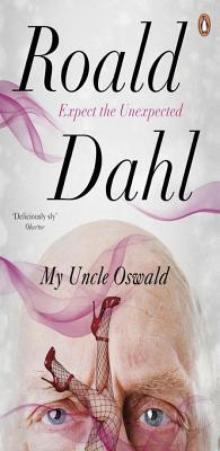 My Uncle Oswald
My Uncle Oswald The Best of Roald Dahl
The Best of Roald Dahl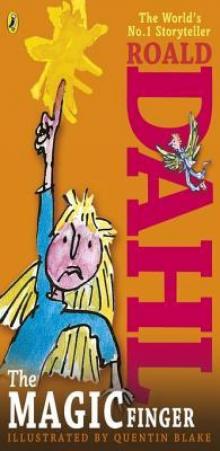 The Magic Finger
The Magic Finger Charlie and the Chocolate Factory
Charlie and the Chocolate Factory Fantastic Mr Fox
Fantastic Mr Fox Matilda
Matilda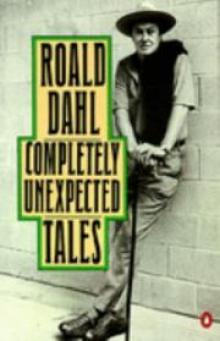 Completely Unexpected Tales: Tales of the Unexpected. More Tales of the Unexpected
Completely Unexpected Tales: Tales of the Unexpected. More Tales of the Unexpected The Wonderful Story of Henry Sugar and Six More
The Wonderful Story of Henry Sugar and Six More The Twits
The Twits The BFG
The BFG Danny the Champion of the World
Danny the Champion of the World The Witches
The Witches James and the Giant Peach
James and the Giant Peach Charlie and the Great Glass Elevator
Charlie and the Great Glass Elevator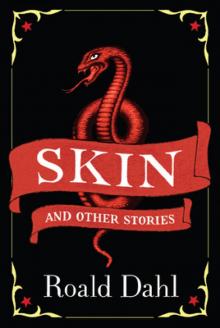 Skin and Other Stories
Skin and Other Stories Kiss Kiss
Kiss Kiss Switch Bitch
Switch Bitch The Giraffe and the Pelly and Me
The Giraffe and the Pelly and Me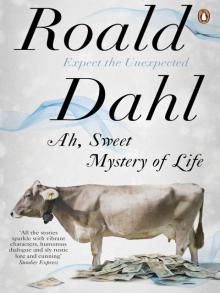 Ah, Sweet Mystery of Life
Ah, Sweet Mystery of Life Fear
Fear The Great Automatic Grammatizator and Other Stories
The Great Automatic Grammatizator and Other Stories Someone Like You
Someone Like You Charlie and the Great Glass Elevator c-2
Charlie and the Great Glass Elevator c-2 More About Boy
More About Boy Tales of the Unexpected
Tales of the Unexpected The Umbrella Man and Other Stories
The Umbrella Man and Other Stories Dirty Beasts
Dirty Beasts Roald Dahl's Mischief and Mayhem
Roald Dahl's Mischief and Mayhem The Collected Short Stories of Roald Dahl, Volume 1
The Collected Short Stories of Roald Dahl, Volume 1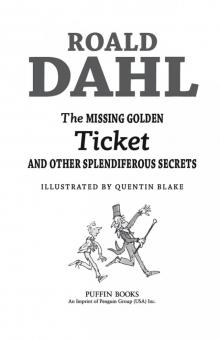 The Missing Golden Ticket and Other Splendiferous Secrets
The Missing Golden Ticket and Other Splendiferous Secrets Billy and the Minpins
Billy and the Minpins Over to You
Over to You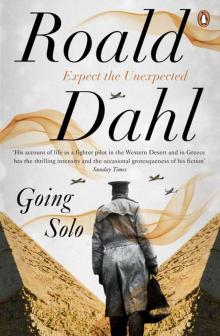 Going Solo
Going Solo Deception
Deception War
War Man from the South ee-3
Man from the South ee-3 More Tales of the Unexpected
More Tales of the Unexpected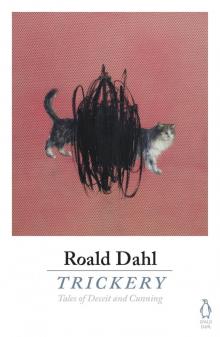 Trickery
Trickery Rhyme Stew
Rhyme Stew Charlie and the Chocolate Factory (Puffin Modern Classics relaunch)
Charlie and the Chocolate Factory (Puffin Modern Classics relaunch) D is for Dahl
D is for Dahl Roald Dahl Whoppsy-Whiffling Joke Book
Roald Dahl Whoppsy-Whiffling Joke Book Spotty Powder and other Splendiferous Secrets
Spotty Powder and other Splendiferous Secrets Charlie and the Chocolate Factory c-1
Charlie and the Chocolate Factory c-1 Boy
Boy Completely Unexpected Tales
Completely Unexpected Tales Madness
Madness Innocence
Innocence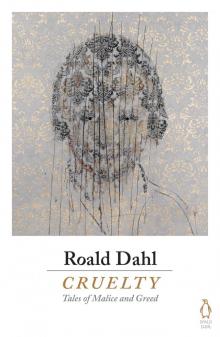 Cruelty
Cruelty George's Marvellous Medicine
George's Marvellous Medicine